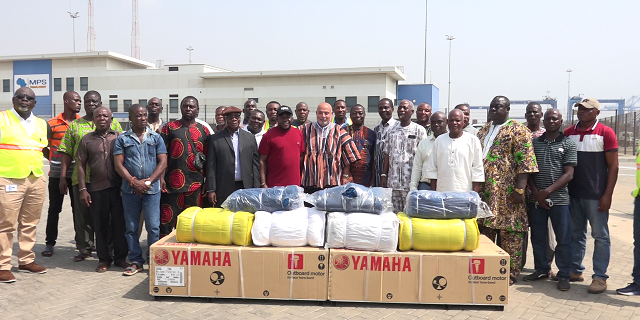Meridian Port Services Ltd (MPS), operators of the world-class Terminal 3 at the Port of Tema has continued to demonstrate its interest in the socio-environmental sustainability of the community in which it operates.
The terminal operator has over the years built and operated a modern port facility that allows Ghana to be a transhipment hub in the global shipping industry, with its trickle-down effect on the local economy.
MPS intends to use this success to help bolster the economic fortunes of the community it operates in while maintaining social and environmental sustainability.
The company has recently donated 2000 bundles of fishing nets, 35 Yamaha outboard motors of 40 horse power, and 2 canoes with accessories at a cost of 6 million Cedis.
These were handed over to representatives of the fishing communities of Tema, Nungua, Ningo, Prampram and Kpone last Thursday to boost fishing activities.
MPS has also begun preparations to launch the Alternative Livelihood project to help cater for the future generation within these communities.
What is important is the job creation for the children and the generation to come, because the children will not all go to follow their fathers at sea – one or two will.
So for the livelihood and development of others, we are trying to create venues and opportunities and the port in itself, is an economic infrastructure for other businesses to spring up and thrive on to also employ other people who is really crucial,” Chief Executive Officer of the Meridian Port Services, Mohammed Samara, explained.
He revealed that MPS has begun partnerships with key state agencies and key civil society organisations to explore ways to implement this Alternative Livelihood Project.
The CEO of MPS, Mohammed Samara also touched on the MPS Sea Turtle Hatchery intended to rescue endangered species and promote biodiversity.
“The Turtle serve a role in nature. First, you have the type which is acting like a grass mower where they eat the grass which creates avenue for new grass which serves as new habitat for fish to thrive on.
Others eat the jelly fish that are notorious for eating young fishes. So by increasing the leather back turtles in the sea, it keeps that in check reducing the depletion of fish stock. It is important now because we are in the jellyfish season that means we are competing with the jellyfish for fish.”
